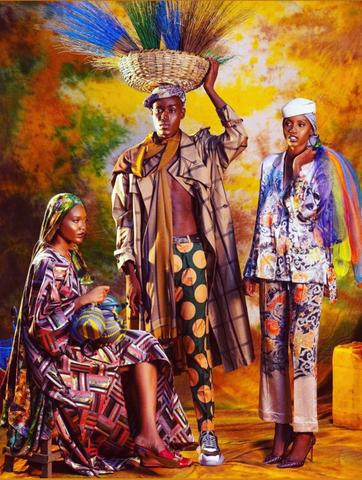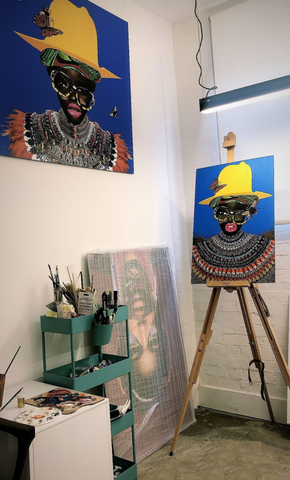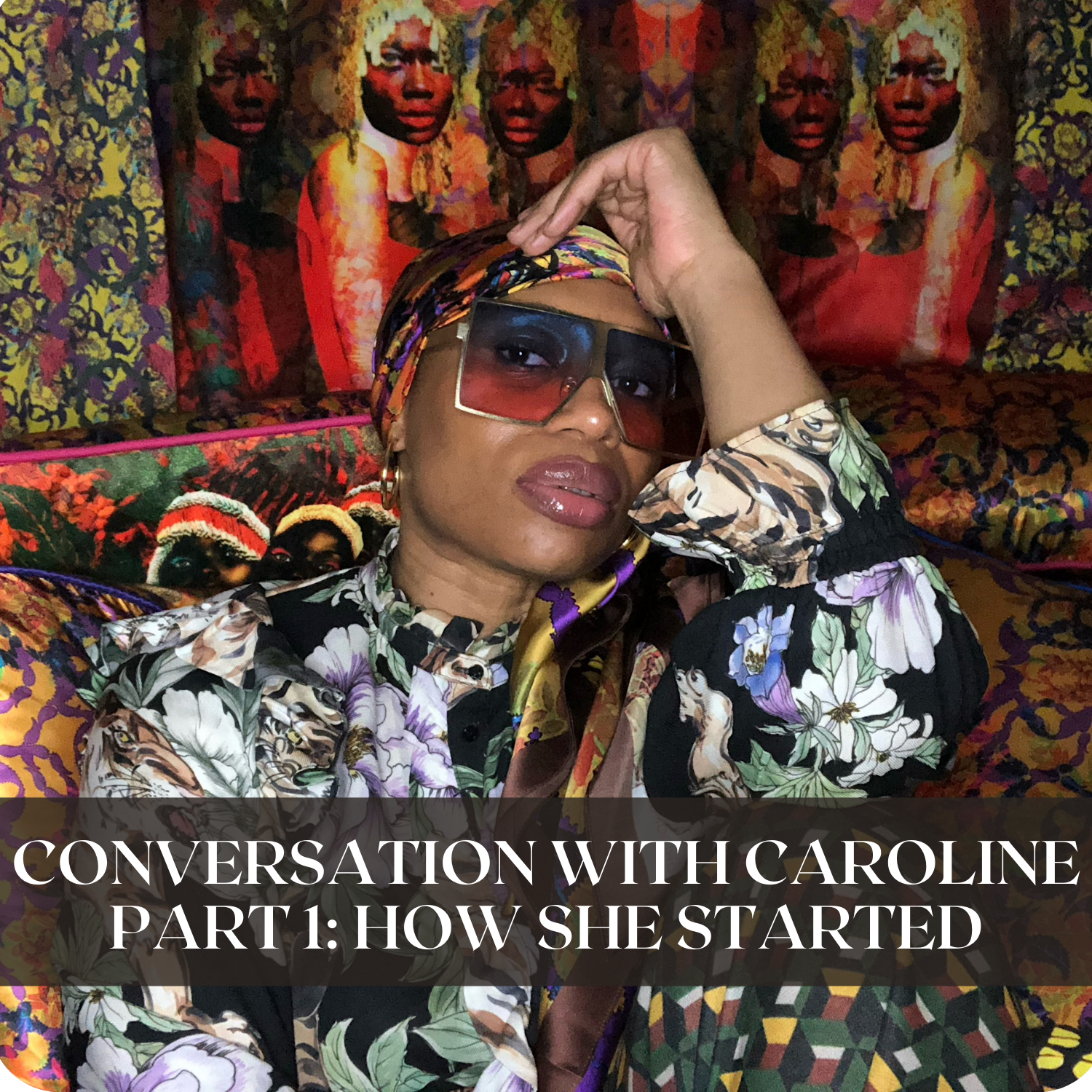
To inaugurate the start of the year, we are kicking it off with a conversation with our founder Caroline Chinakwe. She is not only a mixed-media artist but also an entrepreneur, stylist, black woman and a mother of 3. Born in Nigeria, she has grown up and is based in London. Caroline is known for her colourful, powerful, and unapologetic visuals that capture the beauty found in black culture and style while addressing social issues that affect people of colour. In this 3 part interview Caroline tells us about her life, career in the fashion industry and what led her to take the bold decision of transitioning from her 20-year fashion career into pursuing a new journey into an industry she knew nothing about, but believed was her true passion.
Through Caroline’s words, we understand how all the different elements of her upbringing, heritage and career come together into Chinakwe, a brand that aims to be the missing bridge between African culture, legacy and artistry in the Western world.
Caroline, you worked for more than 20 years in the fashion industry. Were you always passionate about fashion? Did you know from the beginning it would be your thing in life?

Fashion was something that just happened to me, I knew I was creative, but I thought I would go more into the direction of acting or music. Going into fashion was a pure fluke, but I quickly realised I loved working with fabric and especially enjoyed making things. That’s where I found my passion to create. I graduated from London College of Fashion and worked in all areas of the fashion industry. Starting off in production and going into designing with manufacturing companies that were supplying to the high street brands.
I soon realised I didn’t enjoy being controlled and being told what to design. I approached design in a totally different way, I would sit with the sewing machine and just come up with new designs along the way. At 23, I became a mother and felt that it was the right time to transition to self-employment. I’ve been a freelancer since and covered many roles: I was a designer, stylist, consultant for upcoming brands as well as a maker, soon after about 10 years in the industry, I got into personal styling.
What was your experience as a black designer/stylist in the industry?
I saw there wasn’t much support for black designers in the UK. Amazingly talented people were doing all the designing and production work but were relegated to the back rows, to let “white brands” shine. In the last years of my career, when I was mainly focused on styling, I was trying to support African designers.
I organised and promoted African Fashion Week with other creatives like Samson Soboye to give black designers a platform to showcase their work. What we did was really inspiring to me, so I started doing a lot of styling in my homeland, Nigeria.
How does Nigerian fashion and creativity overall differ from what you experienced in London?

When I started working there more, it really struck me how different design is: we love our culture and that really shows in our style. Creativity is also on another level, we love experimenting with fabrics, prints and colour. It was so different and I really wanted to see that here in the UK. Obviously, here you need to conform to the western idea of style and fashion, whereas in Nigeria I realised how much potential we have that we restrain. That’s when I started feeling very stifled and started disliking the fashion industry in the West. I didn’t know if I wanted to be part of that anymore.
Were you starting to lose your interest and enjoyment in fashion?
As a black designer and creative, I could see big western brands being influenced by African designers, in terms of prints and fabrics and failing to acknowledge it. I would say African creativity has inspired western creativity and culture a lot. And that’s been the issue we’ve had: we’ve been doing the work but not being given the credit. Creatives like Dapper Dan, produced a whole new collection and now for the first time has been recognized by fashion houses, 30 years after the same houses forced him to shut down his business.
Do you think the gatekeepers of the fashion industry are starting to open their doors?
They have no choice. Social media doesn't let brands get away with racism or cultural appropriation anymore. I’m against “cancel culture”, though. I think the internet can be a place to educate brands and people, so that they grow and change, rather than breed more anger.
How did you start approaching art and realized it was the next chapter in your creative career?

When I started my social media in 2017, I didn’t really know what I should put there. I knew they are a powerful platform but I didn’t have much work to display yet. That’s when I started collaging: I put together images of black models that I would find online and started styling them my own way, doing it on a canvas rather than on a real person. People started following me for that and they would call it art. Everyone who knows me knows how much I fought against being called an ‘artist’ because usually, art is painting, acrylic, a standard canvas that you see in a museum. I didn’t really think about digital art being “proper art”.
Later on in 2019, I understood that was what I truly wanted to do. People started to enquire about how to purchase my work and I really felt it was the right path for me, because it still allowed me to be in fashion, but in a very different way. I was still able to work with designers like Anita Quansah and BiBi, whose work I used in a lot of my artworks. And that’s how it started.
How was the transition into this new career? Was it hard to leave your network and your safe space to start something new?
In the beginning, I was just creating and going with the flow. Art was an industry I knew nothing about, but I had a friend who loved my work and introduced me to some people in the industry. People might think that fashion and art are similar, but actually, the creative industry is so vast, it spans from fashion, music, art, dance... all these fields are very different from each other.
I was new to this world and I learnt everything from scratch. I educated myself and did my research. I’m also a self-taught artist, so I’m still learning about what I need to do and how to produce my work in the best quality. I’m still learning about photography, digital art and painting. I think it’s something I will carry on forever, that’s how it is with any kind of art.
How did you move your first steps into the art industry? Did you have any setbacks?

The first time I showcased my work was in 2018, at an event where fashion met art. I was still very much in fashion but I had all the artwork I was working on, and I was slowly shifting towards this new creative path. The decision to leave fashion wasn’t easy because I was moving from a world that felt safe to me, towards a career that was unstable, unknown, and I didn’t know if it would work out. It was a scary transition and I knew it was hard, so I had to prepare myself.
In 2019, I wasn’t getting any work from fashion, as I was concentrating on my artworks and starting this new business. People around me thought I was still doing both, you can’t really tell others how hard things really are. The deepest point of my depression was halfway through 2019, when I started wondering if it really was the right decision to dive into something completely new. I was thinking about my children and all the daily life expenses. But within me I kept telling myself after that dark time I would find myself on the other side, that things would work out.
And how did it go?
At the end of 2019, I started being on a high. People were interested in buying my work, I was starting to get noticed in this new industry and luckily things did work out. I was really excited for 2020, also because I had my first exhibition under the agency GoRougue, which unfortunately was blocked by the pandemic. Anyway, any transition is scary, but I knew it was the right thing to do...
Thankyou for tuning into Part 1 of Conversation with Caroline, we will soon be releasing Part 2: Transitioning into Art. To stay updated, make sure you sign up to our newsletter so you're the first to know when it has been relased.
Happy Afro-luxing!
Useful Links:


